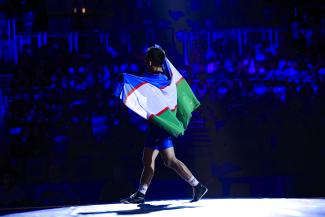16 Olympic and World Medalists to Compete at FR World Clubs Cup
Tuesday, December 5, 2017 - 15:53 By Ali Feizasa

The 2017 World Clubs Cup is set to be held in Tehran City, Iran, with many Olympic and World champions getting ready to step on mat at the Azadi Sport complex.
About 16 Olympic and World medalists will compete in the World Clubs Cup on Thursday and Friday.
The roster of two-time World Clubs Cup champion Bimeh Razi bolsters six Olympic and world medalists. Russian Olympic and world medalists who will be completing for Bimeh Razi include Olympic and World champion Abdulrashid SADULAEV (RUS), Rio Olympics runner-up Aniuar GEDUEV (RUS), and 2014 world champion and silver medalist Khetik TSABOLOV (RUS).
Also wrestling for the tournament favorite, Bimeh Razi will be 2016 Olympic silver medalist Komeil GHASEMI (IRI), three-time world medal winner Masoud ESMAEILPOUR (IRI), and two-time world medalist Seyed Ahmad MOHAMMADI (IRI).
Defending championships, Titan Mercury Wrestling Club will send another potential title team to Iran to defend last year’s championship. In last years narrow match, TMWC beat Bimeh Razi in Ukraine to win World Clubs Cup title.
In addition to 2016 Olympics and 2017 world champion Kyler Snyder, other world medalists in the Titan Mercury line-up include Thomas Gilman, Franklin Gomez, and Nick Gwiazdowski.
Another Iranian team, Easy Pipe Kashan has signed contracts with Georgian stars Geno PETRIASHVILI (GEO) and Vladimir KHINCHEGASHVILI (GEO). Also wrestling for Easy Pipe Kashan is 2015 world bronze medal Alireza KARIMI (IRI) and Russian Vladislav BAITSAEV (RUS).
The third Iranian team, Setaregan Sari is lined with three world champions from Russia and Azerbaijan. Accompaning the team will be 2017 world champion Haji ALIEV, 2015 world champion Magomed Rasul GAZIMAGOMEDOV and 2016 world gold medal winner Magomed KURBANALIEV (RUS).
The event will be the first test for these champions to compete with the new weigh-in rules and the 10 weight categories.
Predictable roster of the teams before weigh-in for Freestyle World Clubs Cup:
Bimeh Razi (Iran)
57kg- Younes SARMASTI (IRI)
61kg- Masoud ESMAEILPOUR (IRI) – Iman SADEGHI (IRI)
65kg- Meysam NASIRI – Seyed Ahmad MOHAMMAD (IRI)
70kg- Hamed RASHIDI (IRI)
74kg- Khetik TSABOLOV (RUS) – Bahman TEYMOURI (IRI)
79kg- Aniuar GEDUEV (RUS)
86kg- Mohammad Javad EBRANHIMI – Kamran GHASEMPOUR (IRI)
92kg- Abdulrashid SADULAEV (RUS)
97kg- Mojtaba GOLEIJ (IRI)
125kg- Komeil GHASEMI (IRI) – Yadollah MOHEBI
Titan Mercury (USA)
57kg- Thomas GILMAN (USA)
61kg- Alan WATERS (USA)
65kg- Franklin GOMEZ (PUR) - B.J. FUTRELL (USA)
70kg- Nazariy KULCHYTSKYY (USA)
74kg- Isaiah MARTINEZ (USA)
79kg- Kyle DAKE (USA)
86kg- David TAYLOR (USA)
92kg- TBD
97kg- Kyler SNYDER (USA)
125kg- Nick GWIAZDOWSKI (USA)
Easy Pipe Kashan (Iran)
57kg- Reza ATARI (IRI)
61kg- Vladimir KHINCHEGASHVILI (GEO)
65kg- Mehran NASIRI (IRI) – Farzad Amouzad KHALILI
70kg- Mohammad NADERI (IRI) – Hamidreza ZARRINPEYKAR
74kg- Saeid DADASHPOUR (IRI) – Hossein ELYASI (IRI)
79kg- Reza AFZALI (IRI)
86kg- Alireza KARIMI (IRI)
92kg- Hossein SHAHBAZI (IRI) – Arashk MOHEBBI (IRI)
97kg- Vladislav BAITSAEV (RUS)
125kg- Geno PETRIASHVILI (GEO)
Georgia Club
57kg- Roberti DINGASHVILI (GEO)
61kg- Otari GOGAVA (GEO) – Teimuraz VANISHVILI (GEO)
65kg- Edemi BOLKVADZE (GEO) – Nika BUSHELASHVILI
70kg- Levan KELEKHSASHVILI (GEO)
74kg- Giorgi LOBJANIDZE (GEO)
79kg- Tariel GAPHRINDASHVILI
86kg- Zaur BERADZE (GEO)
92kg- Saba CHIKLADZE
97kg- Zurabi AKHOBDZE
125kg- Levani GOGRICHIANI (GEO)
Setaregan Sari (Iran)
57kg- Nader HAJAGHANIA (IRI)
61kg- Mohammad RAMEZANPOUR – Mohammad NAMJOUMOTLAGH
65kg- Haji ALIEV (AZE) - Hassan MORADGHOLI
70kg- Magomed KURBANALIEV (RUS) - Sajad ZABIHI (IRI)
74kg-Magomed Rasul GAZIMAGOMEDOV
79kg-Omid HASANTABAR
86kg- Esmaeil MAHMOUDI
92kg- Abazar ESLAMI – Seyed Mohammad SADATI (IRI)
97kg- Esmaeil NEJATIAN (IRI)
125kg- Jaber SADEGHZADEH (IRI)
India Club
57kg- Amit KUMAR (IND)
61kg- Ravinder (IND)
65kg- Sonu (IND)
70kg- Vinod KUMAR (IND)
74kg- Ver Dev GULIA (IND)
79kg- Jitender (IND)
86kg- Pawan Kumar (IND)
92kg- Somveer (IND)
97kg- Viky (IND)
125kg- Pushpender Singh (IND)
Mongolian Club
57kg- TSEVEENSUREN Tsogbakrakh MGL)
61kg- BATCHULUUN Basaniam (MGL)
65kg- TUMUR OCHIR Tulga (MGL)
70kg- LUTBAYAR Batbayar
74kg- BOLDKHUU Batsukh (MGL)
79kg- TBD
86kg- GANBATAAR Gankhuyag
92kg- TBD
97kg- TUMURBAT Mungushagai (MGL)
125kg- MUNKHTUR Lkhagvegerel (MGL)
Hungary Club
57kg- Tamas ROMAN (HUN)
61kg- Jozsef MOLNAR
65kg- TBD
70kg- Norbert LUKACS (HUN)
74kg- Zsombor GULYAS (HUN)
79kg- Botond LUKACS (HUN)
86kg- Patrik SZUROVSZKI (HUN)
92kg- TBD
97kg- Balazs JUHASZ (HUN)
125kg- Mihaly NAGY (HUN)
Kazakhstan Club
57kg- Gulomjon ABDULLAYEV – Zhavokhir IRUSTAYEV
61kg- Assylkhan KARIPBEKOV
65kg- Sultan BEISOV (KAZ)
70kg- Dauren ZHUMAZAZYYEV – Yerlan TOLEBAY
74kg- Tsotne BARAMIDZE (KAZ) – Muhamedsultan KOPBAYEV
79kg- Adam HASIEV
86kg- Sandro AMINASHVILI (GEO)
92kg- Alisher YERGALI (KAZ)
97kg- Akhmed BATAEV (RUS)
125kg- Rassul KHATAYEV
Kirgizstan Club
57kg- Nurlat TAKIROV
61kg-Zhainak TURGUNBAEV (KGZ)
65kg- Edil KADYRBEK UULU (KGZ) 70kg- Adilet MAMATAEV (KGZ)
74kg- Atai IZABEKOV (KGZ)
79kg- TBD
86kg- Dinislambek TAALAIBEK UULU (KGZ)
92kg- TBD
97kg- Kantoro TALANBEK UULU (KGZ)
125kg- Emil ASHYRALIEV (KGZ)
Canada Club
57kg- Trevor BANKS (CAN)
61kg- Steven TAKAHASHI (CAN)
65kg- Vicent DE MARINIS
70kg- TBD
74kg- Ahmed SHAMIYA (CAN)
79kg- Guseyn RUSLANZADA (CAN)
86kg- Alexander MOORE (CAN)
92kg- Jordan STEEN (CAN)
97kg- Frederick CHOQUETTE (CAN)
125kg- Korey JARIVS (CAN)
Bulgaria Club
57kg- TBD
61kg- Strahil PARALOV
65kg- Boycho BOYCHEV (BUL)
70kg- Miroslav HRISTOV (BUL)
74kg- Persiyan MIHOV (BUL)
79kg- Hasan MOLLA (BUL)
86kg- Petar SAVAKOV
92kg- Georgi DIMITROV (BUL)
97kg- Dimitar KARAIVANOV
125kg- Mert EMIN


Share your thoughts.
Comments